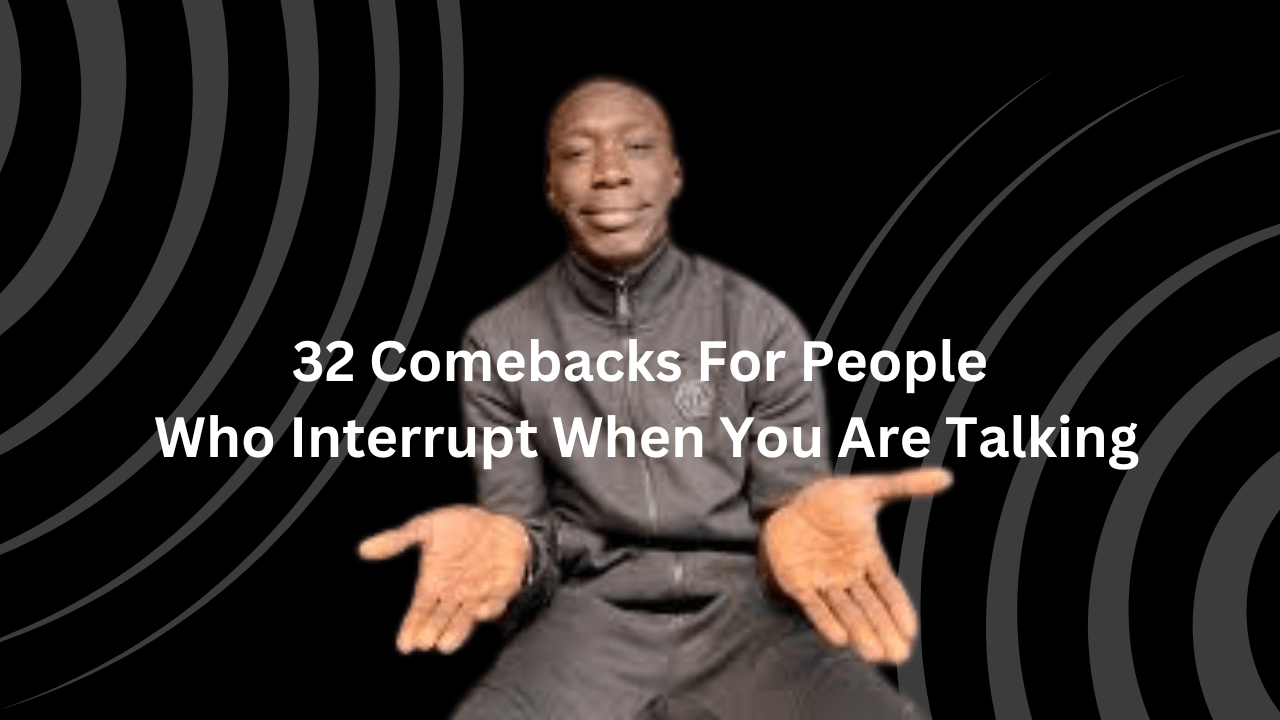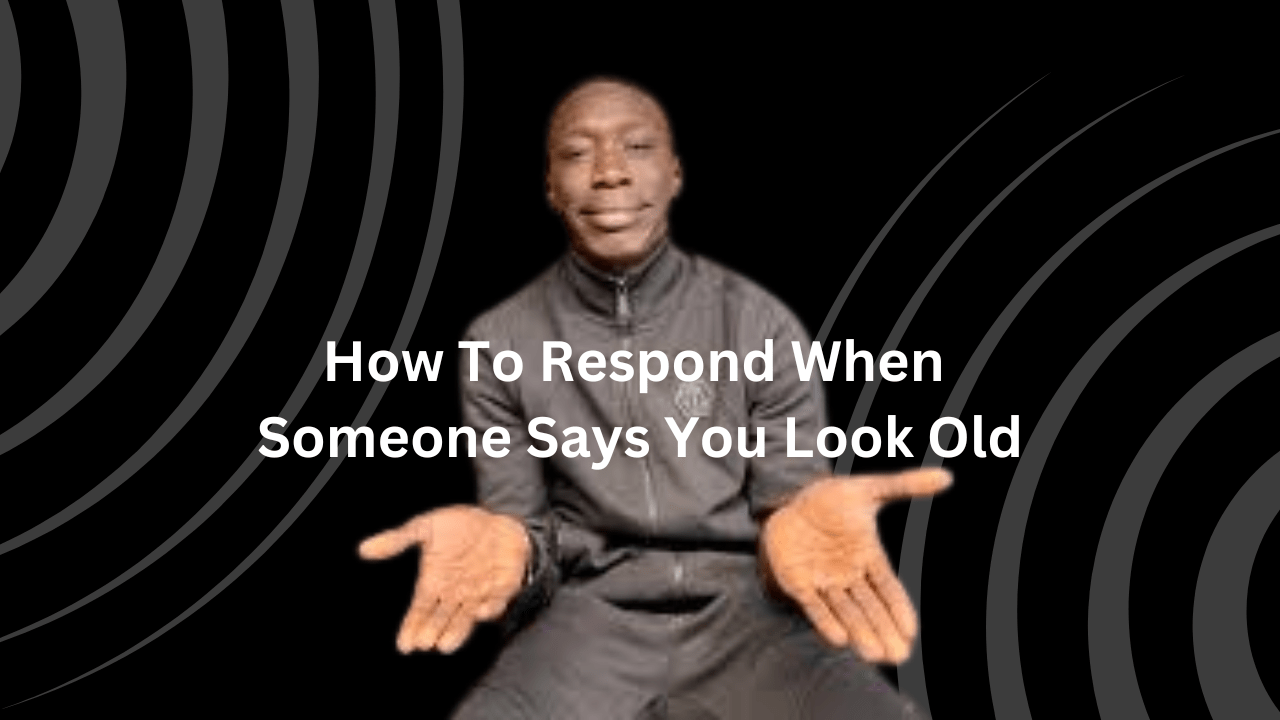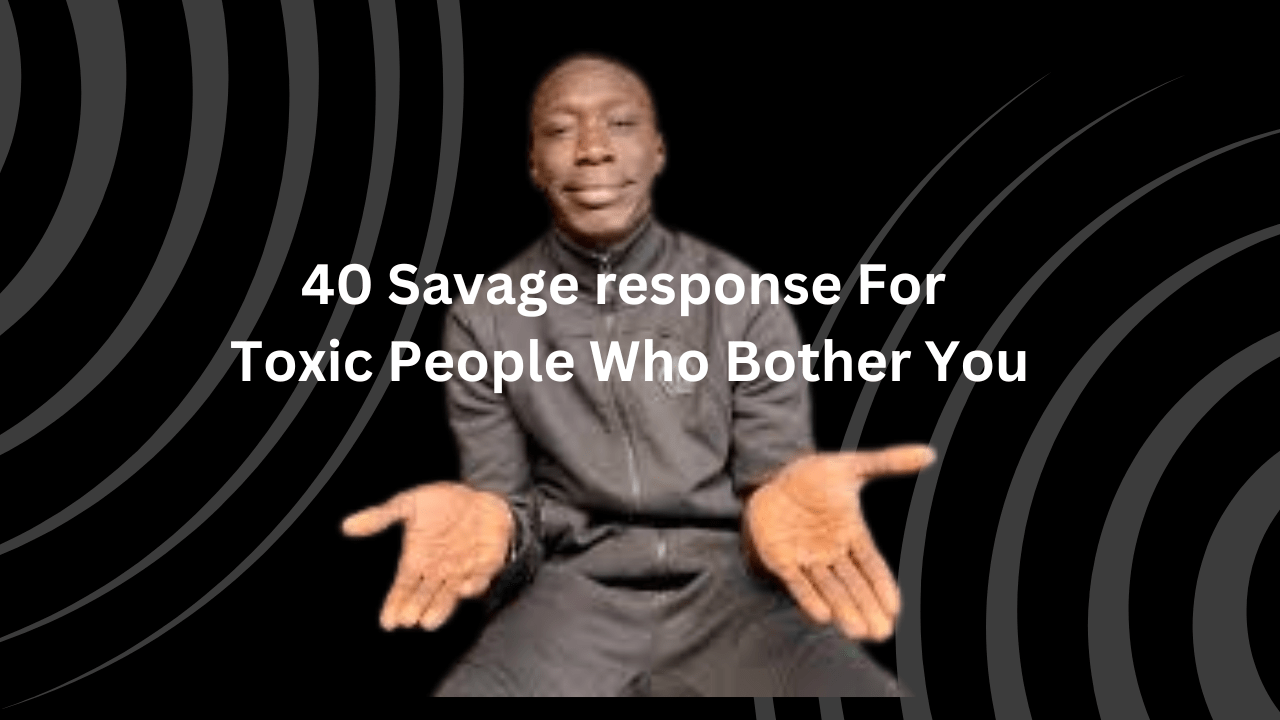Communication is the cornerstone of human interaction, but interruptions can disrupt the flow of conversation and hinder effective dialogue. Whether it’s a colleague cutting in during a meeting or a friend constantly talking over you, dealing with interruptions can be frustrating. However, mastering the art of assertive communication can empower you to navigate these situations with confidence and grace. In this article, we’ll explore the importance of assertiveness in handling interruptions and provide you with 32 comebacks For People Who Interrupt When You Are Talking.
Assertive Communication vs. Passive or Aggressive Responses:

Assertive communication is a communication style characterized by confidence, respect for oneself and others, and the ability to express thoughts and feelings clearly and directly. Unlike passive communication, which involves avoiding conflict and often leads to feelings of resentment, or aggressive communication, which involves dominating others and disregarding their feelings, assertive communication strikes a balance between standing up for oneself and being considerate of others.
Assertive communication is particularly effective in handling interruptions because it allows you to assert your right to speak without resorting to aggression or passivity. By calmly and confidently expressing your needs and boundaries, you can establish mutual respect and create a more conducive environment for meaningful dialogue.
Read this post also: “Comebacks for Low Ball Offers: Try these 20 strategies”
Types of Interruptions:

Interruptions can take various forms, including verbal, non-verbal, and digital interruptions. Verbal interruptions occur when someone speaks over you or cuts you off mid-sentence. Non-verbal interruptions, such as eye rolling or sighing, convey impatience or disinterest. Digital interruptions, like receiving text messages or notifications during a conversation, can also divert attention and disrupt communication.
Understanding the different types of interruptions can help you identify the most appropriate response in each situation. Whether you’re dealing with a chatty coworker, a distracted friend, or a smartphone addict, having a repertoire of assertive comebacks can help you regain control of the conversation and assert your presence.
Here are 32 best comebacks For People Who Interrupt When You Are Talking

“Excuse me, I was still speaking.”
This comeback is a straightforward assertion of your right to continue speaking uninterrupted. It politely reminds the interrupter that you were in the middle of expressing your thoughts.
“I appreciate your enthusiasm, but I’d like to finish my thought.”
This response acknowledges the interrupter’s eagerness to contribute while asserting your need to complete your statement first. It strikes a balance between appreciation and assertiveness.
“Let’s take turns speaking, shall we?”
By suggesting a turn-taking approach to the conversation, this comeback encourages the interrupter to respect your speaking time and promotes fair and balanced dialogue.
“I’ll get to your point in a moment, but let me finish mine first.”
This comeback acknowledges the importance of the interrupter’s point while asserting your priority to complete your thought before addressing theirs.
“I’m sorry, did the middle of my sentence interrupt the beginning of yours?”
This comeback uses humor to point out the interrupter’s rudeness while subtly reminding them of the etiquette of conversation.
“I understand you’re eager to share your perspective, but I’d appreciate it if you let me finish.”
This response acknowledges the interrupter’s desire to contribute while firmly asserting your need to complete your statement before engaging with theirs.
“Could you please hold your thoughts until I’m done?”
This comeback directly requests the interrupter to refrain from speaking until you’ve finished expressing yourself, setting clear boundaries.
“I’ll be happy to listen to your input after I’ve finished.”
By expressing willingness to listen to the interrupter’s input after completing your thought, this response emphasizes the importance of respecting each other’s speaking time.
“I feel like I’m not being heard when you interrupt me like that.”
This comeback communicates the impact of interruptions on your ability to express yourself effectively, highlighting the importance of active listening and mutual respect.
“Let’s practice active listening and give each other the courtesy of speaking without interruptions.”
This response suggests a collaborative approach to communication, emphasizing the importance of active listening and mutual respect for each other’s speaking time.
“I’m not finished yet, please wait your turn.”
This comeback firmly asserts your need to complete your statement before allowing the interrupter to speak, emphasizing the importance of respecting each other’s speaking order.
“It seems like we’re talking over each other, let’s try to be more mindful of that.”
By acknowledging the mutual interruption and suggesting a solution, this response encourages both parties to be more mindful of their speaking dynamics and promotes smoother communication.
“I value your input, but I need to finish what I was saying first.”
This comeback expresses appreciation for the interrupter’s input while asserting your priority to complete your thought before engaging with theirs, maintaining a balanced approach to communication.
“Interrupting me won’t make your point any more valid.”
This response addresses the ineffectiveness of interruptions in bolstering the interrupter’s point, highlighting the importance of allowing each person to express themselves fully.
“I’ll pause for a moment to let you collect your thoughts, then I’ll continue.”
By offering the interrupter a moment to gather their thoughts, this comeback demonstrates patience and consideration while asserting your intention to continue speaking.
“Could you please let me finish my sentence before jumping in?”
This response directly requests the interrupter to refrain from speaking until you’ve completed your sentence, emphasizing the importance of uninterrupted communication.
“I’m finding it difficult to express myself when I keep getting interrupted.”
This comeback communicates the impact of interruptions on your ability to communicate effectively, highlighting the need for uninterrupted speaking to convey your thoughts clearly.
“Your input is important, but so is mine. Let’s give each other the space to speak.”
This response emphasizes the equality of both parties’ contributions to the conversation while asserting the need for each person to have their speaking space respected.
“I’d appreciate it if you’d let me speak without interruptions.”
By directly expressing your desire for uninterrupted speaking, this comeback sets clear boundaries and expectations for the conversation.
“If you could hold your comments until I’m done, I’ll make sure to listen attentively to yours.”
This response offers a compromise by requesting the interrupter to refrain from speaking until you’ve finished and promising to listen attentively to their input afterward, promoting mutual respect and understanding.
“I’m eager to hear your perspective, but I’d like to finish mine first.”
This comeback acknowledges the value of the interrupter’s perspective while asserting your need to complete your thought before engaging with theirs, maintaining a balanced approach to communication.
“Interrupting me won’t speed up the conversation, it’ll only disrupt it.”
This response highlights the counterproductiveness of interruptions in facilitating constructive dialogue, emphasizing the importance of allowing each person to speak without interruptions.
“Let’s practice active listening and refrain from interrupting each other.”
This comeback suggests a collaborative approach to communication by encouraging both parties to practice active listening and respect each other’s speaking time, promoting smoother and more productive dialogue.
“I’ll be happy to address your concerns once I’ve completed my thought.”
This response expresses willingness to engage with the interrupter’s concerns but asserts the need to complete your thought first, maintaining a balanced approach to communication.
“It seems like we’re talking past each other. Let’s take turns speaking.”
By acknowledging the lack of effective communication and suggesting a turn-taking approach, this comeback encourages both parties to listen to each other’s perspectives and promotes mutual understanding.
“I’m not sure if you’re aware, but you keep interrupting me.”
This response brings attention to the interrupter’s behavior in a non-confrontational manner, encouraging them to be more mindful of their tendency to interrupt and promoting smoother communication.
“I’m trying to convey my point, but I keep getting interrupted.”
This comeback communicates the difficulty of expressing your point due to interruptions, highlighting the importance of uninterrupted communication in conveying your thoughts effectively.
“Let’s respect each other’s speaking time and avoid interruptions.”
By emphasizing the importance of respecting each other’s speaking time, this response promotes mutual understanding and smoother communication dynamics.
“I’ll give you the floor once I’ve finished my point.”
This comeback promises to allow the interrupter to speak once you’ve completed your statement, maintaining a balanced approach to communication while asserting your need to finish expressing yourself.
“It’s important to me that I’m able to express myself without interruptions.”
This response expresses the importance of uninterrupted communication to you, setting clear boundaries and expectations for the conversation.
“I feel like my thoughts are being disregarded when I’m constantly interrupted.”
This comeback communicates the impact of interruptions on your feeling of being heard and understood, highlighting the importance of allowing each person to express themselves fully.
“I’m happy to engage in a dialogue, but interruptions disrupt the flow of conversation.”
This response expresses willingness to engage in dialogue while asserting the disruptive nature of interruptions, promoting smoother communication dynamics and mutual understanding.
Tips for Effective Comebacks:
Maintaining composure and staying calm is key when delivering comebacks to interruptions. Using assertive body language, such as maintaining eye contact and speaking confidently, can reinforce your message. Practice active listening to demonstrate your respect for the other person’s perspective while asserting your right to speak uninterrupted. Adapt your comebacks to the situation and individual, taking into account factors such as the context of the conversation and the dynamics of the relationship.
Conclusion:
Mastering assertive communication is essential for navigating interruptions and maintaining productive dialogue. By using assertive comebacks to address interruptions, you can assert your presence, express your thoughts and feelings clearly, and establish boundaries that promote mutual respect and understanding. Remember, assertiveness is not about dominating others or avoiding conflict; it’s about confidently expressing yourself while respecting the rights and feelings of others. With practice and patience, you can become a more assertive communicator and cultivate healthier, more fulfilling relationships in all areas of your life.










